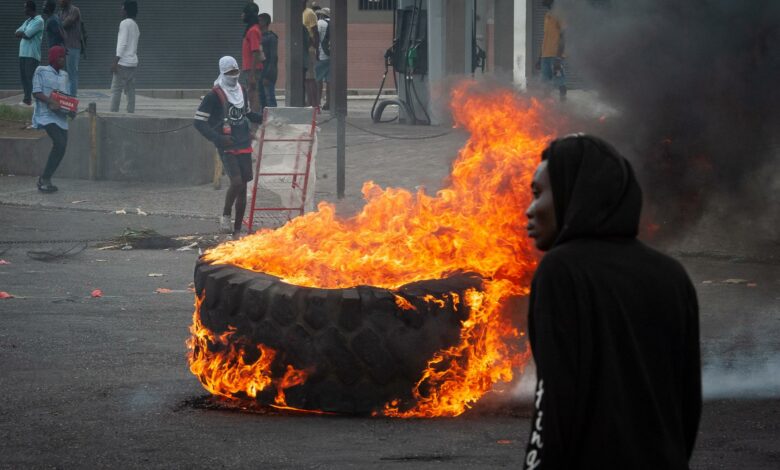
The Haitian government announced last week that it will be doubling the already absurdly high fuel prices in the country. The fuel prices are but one of many reasons behind their rebellion. However, this latest offense has kicked off an accelerated round of rebel action. Youth have taken to the streets and have barricaded Port-au-Prince. Multiple banks have been burned, while the homes of politicians and their bourgeois supporters have been attacked.
On September 15th, Haitian rebels in Port-au-Prince stormed the offices of State media and set fire to three vehicles. They also expropriated food and other supplies from two warehouses in Les Gonaïves: one belonging to Caritas, a Catholic NGO; and the other belonging to the World Food Program. Demonstrators looted several homes before burning them down, including that of former senator Edmonde Supplice Beauzile.
On the 16th, two UN program offices and three businesses belonging to the mayor and his family were attacked in Gonaïves. That same day, in Port-au-Prince, demonstrators fought cops, built flaming barricades, and looted and torched a bank. Rebels in Léogâne also torched a bank that day, in addition to looting the General Directorate of Taxes and setting it ablaze.
Once again, the people of Haiti have set before us a shining example of revolutionary potential. In the 1790s and early 1800s. Haiti made world history by becoming the very first country in which enslaved people rebelled against their masters and freed themselves absolutely. During the Haitian Revolution, scores of Haitians repeatedly outmaneuvered and ultimately defeated larger, better-armed contingents of the French army.
The seats of Empire will never forgive Haiti for exposing their myth of invincibility for what it is. The Haitian struggle made plain throughout the world that all empires have inherent weaknesses that can be exploited— and it continues to do so.
Mainstream media reports these events in predictable fashion. Through it, we are presented with terms like “tragedy” and “chaos.” We are made privy to quotes from politicians who don’t want to see the banks that put them in office burned to the ground. We are meant to pity the people of Haiti and hope for the restoration of “order” (the installation of a new US stooge, perhaps?).
There is concern that Haiti may never “return to stability.” One wonders what is considered “stability” in a region that has historically been ravaged by white supremacy, capitalism, and colonialism; one in which people are routinely denied the ability to meet their basic needs.
Absent from these “analyses,” if they can be called such, is the recognition of the awesome people power that is being launched in the streets today. It is too early to tell exactly what the results of this uprising might be; still, that the people of Haiti and not their self-slash-Empire-appointed rulers are truly in charge of what is happening in the streets speaks volumes about the limits of State control and authority.
The truth is that the Haitian people are tenacious, and this tenacity is a beacon to the rest of the world— one of few rays of hope penetrating a bleak horizon. The Haitian struggle continues to remind us that no matter how powerful State forces may seem, no matter how tightly we feel their grip around our necks, oppressed people can and will triumph in the long run. It demonstrates that all that is needed for revolution is a staunch refusal to roll over for the powers that be and a commitment to fighting for a new and better world.
Received by email.